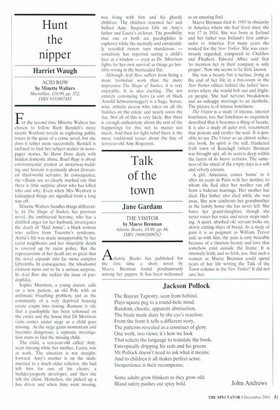Talk of the town
Jane Gardam
THE VISITOR by Maeve Brennan Atlantic Books, £9.99, pp. 86, ISBN 190003809762 Atlantic Books has published for the first time a short novel by Maeve Brennan found posthumously among her papers. It has been welcomed
as an amazing find.
Maeve Brennan died in 1993 in obscurity in America where she had lived since she was 17 in 1934. She was born in Ireland and her father was Ireland's first ambassador to America. For many years she worked for the New Yorker. She was enormously regarded, compared to Chekhov and Flaubert. Edward Albee said that 'to mention her in their company is only proper'. Now she seems to be little known.
She was a beauty but a recluse, living at the end of her life in a box-room in the New Yorker offices behind the ladies' lavatories where she would bob out and frighten people. She had nervous breakdowns and an unhappy marriage to an alcoholic. The picture is of intense loneliness.
The Visitor is a study of intense, interior loneliness, too, but loneliness so exquisitely described that it becomes a thing of beauty. It is also a study of quiet evil, resentment that poisons and erodes the soul. It is possible to see The Visitor as an almost seductive book. Its spirit is the still, blanketed Irish town of Ranelagh (where Brennan was brought up), all its secrets deep within the layers of its heavy curtains. The sameness of the ritual of the empty days is a soft and velvety cocoon.
A girl, Anastasia, comes 'home' to it after six years in Paris with her mother, to whom she fled after her mother ran off from a hideous marriage. Her mother has died. Her father also died while she was away. She now confronts her grandmother in the family home she has never left. She hates her grand-daughter, though she never raises her voice and never stops smiling. A quiet, abashed old servant looks on, slowly cutting slices of bread. As a study of pain it is as poignant as William Trevor and, as with him, the pain is only bearable because of a timeless beauty and love that somehow exist outside the frame. It is intensely Irish; and so Irish, too, that such a woman as Maeve Brennan could spend years of her life writing the Talk of the Town column in the New Yorker! It did not save her.






















































































 Previous page
Previous page